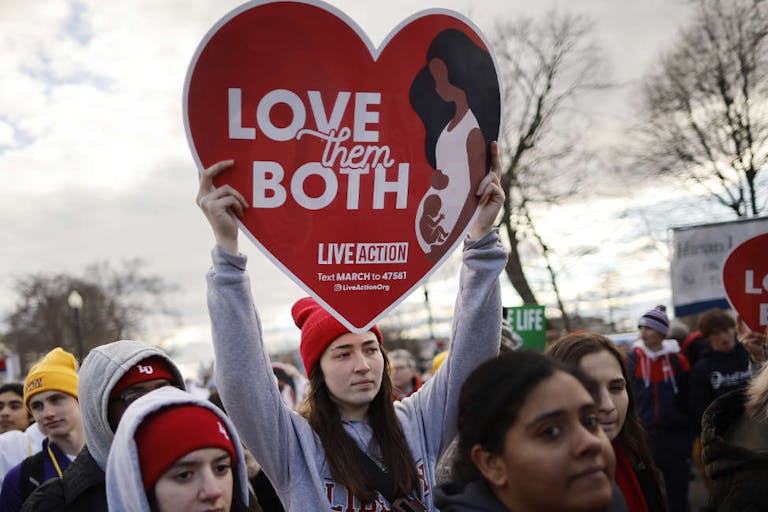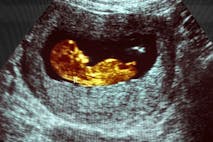
6 reasons to march for life in Texas and other pro-life states
Isabella Childs
·
Guest Column·By Michael J. New
The New York Times misleads on Kansas pro-life defeat
(National Review) Last week’s defeat of the “Value Them Both” amendment in Kansas — which would have reversed a state supreme court ruling finding a right to abortion in the state constitution — has had mainstream-media commentators swooning. Pundits claim the results demonstrate strong support for permissive abortion laws, even in conservative states, as well as that efforts to use direct democracy to protect the preborn in other states are doomed to fail.
Interestingly, when abortion wins at the ballot box, commentators are quick to argue that such elections are politically important and portend future victories for legal abortion. But the media typically ignore pro-life political wins or claim that such victories are the result of gerrymandering, luck, or mere circumstance.
Perhaps the most flawed analysis of the Kansas election results was authored by Nate Cohn and in the New York Times blog “The Upshot.” Cohn claims that based on the results in Kansas, we can determine that voters in only seven states would support an amendment similar to “Value Them Both.” Cohn’s exact methodology is unclear, but he appears to predict how a similar amendment would do in other states based on public attitudes toward abortion. Since “Value Them Both” received only 41 percent support in Kansas, he argues that a similar amendment would succeed only in states whose pro-life sentiment is at least nine points higher than in the Sunflower State.
READ: Pro-abortion deception in Kansas likely to happen in other states
Cohn and other pundits are reading too much into the results of one election. Research on direct democracy suggests that many factors affect the success or failure of ballot questions, including the exact wording of the question, the timing of election, the presence of other ballot questions, and fundraising and spending on both sides of the question.
Article continues below
Dear Reader,
In 2026, Live Action is heading straight where the battle is fiercest: college campuses.
We have a bold initiative to establish 100 Live Action campus chapters within the next year, and your partnership will make it a success!
Your support today will help train and equip young leaders, bring Live Action’s educational content into academic environments, host on-campus events and debates, and empower students to challenge the pro-abortion status quo with truth and compassion.
Invest in pro-life grassroots outreach and cultural formation with your DOUBLED year-end gift!
Additionally, data from other states reveal issues with Cohn’s analysis. In 2020, the Louisiana ballot contained a constitutional amendment similar to “Value them Both,” making it explicit that the state constitution does not contain a right to abortion. Cohn’s model predicts that such a ballot question would receive only about 55 percent of the vote in Louisiana. However, the amendment actually was approved by more than 62 percent of the voters. Similar constitutional amendments were approved by voters in Tennessee in 2014 and voters in Alabama in 2018. In both cases, public support for the measures exceeded Cohn’s predictions.
Furthermore, there were a number of circumstantial reasons why the particular amendment in Kansas was defeated. For one thing, it was drafted well before the Dobbs decision was handed down, and the pro-life organizers in favor of the measure likely failed to anticipate the onslaught of outside money and publicity. The wording of the amendment was somewhat confusing, and post-Dobbs media coverage of life issues has been more biased and partisan than ever. All of these factors played a role in the amendment’s defeat.
Propositions pertaining to abortion are likely to be on the ballot in five other states this fall. Separate ballot questions in California and Vermont would place the right to an abortion in their respective state constitutions. These will be difficult for pro-lifers to defeat. However, a proposed amendment to place a right to “reproductive freedom” in the Michigan constitution provides a unique opportunity for pro-lifers. Fifty years ago, pro-lifers won an unexpected victory in the Wolverine State when they resoundingly defeated Proposal B, which would have legalized abortion up to 20 weeks of pregnancy. History may well repeat itself in 2022. As always, pro-lifers would do well keep up the fight.
Editor’s Note: This article was published at National Review and is reprinted here with permission.
“Like” Live Action News on Facebook for more pro-life news and commentary!
Live Action News is pro-life news and commentary from a pro-life perspective.
Contact editor@liveaction.org for questions, corrections, or if you are seeking permission to reprint any Live Action News content.
Guest Articles: To submit a guest article to Live Action News, email editor@liveaction.org with an attached Word document of 800-1000 words. Please also attach any photos relevant to your submission if applicable. If your submission is accepted for publication, you will be notified within three weeks. Guest articles are not compensated (see our Open License Agreement). Thank you for your interest in Live Action News!

Isabella Childs
·
Politics
Stefano Gennarini, J.D. and Kelly Heilman, J.D.
·
Politics
Right to Life UK
·
Guest Column
Unplanned Stories
·
Guest Column
Rai Rojas
·
Guest Column
Stefano Gennarini, J.D.
·
Guest Column
Michael J. New
·
Guest Column
Michael J. New
·
Guest Column
Michael J. New
·
Guest Column
Michael J. New
·
Guest Column
Michael J. New
·